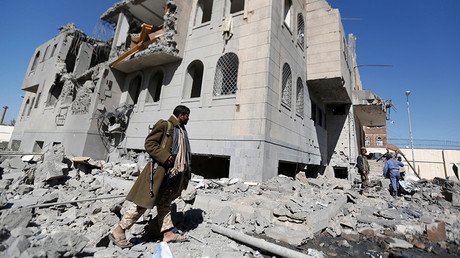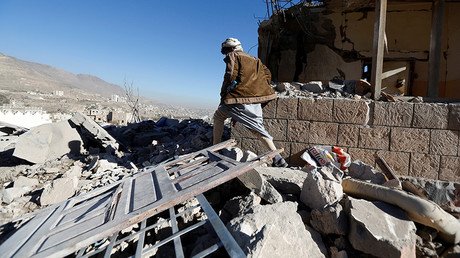‘Yemen is one of the worst places to be a child right now’ – UNICEF representative
Unless there’s a peaceful, political solution to the conflict in Yemen, more children may die in 2018, says Dr. Meritxell Relano, UNICEF representative in Yemen. Millions of children in the country have nothing to eat, she adds.
The United Nations children's agency has called 2017 a nightmare year for children trapped in conflict zones across the globe.
UNICEF says kids can't find refuge at home or at the playground and are exposed to brutal violence on a daily basis in Myanmar, Nigeria, the Democratic Republic of Congo, Syria and in Yemen, where more than a million children are at risk of disease and starvation due to Saudi-led coalition bombing raids.
RT spoke to Dr. Meritxell Relano, UNICEF representative in Yemen, and discussed the situation in the country.
And I am sure that the one for 2017 is going to be appalling when it comes to children killed, maimed, and recruited in #Yemen. What a horrible year for children in this beautiful country....
— Meritxell Relano (@RelanoMeritxell) December 27, 2017
“Yemen is one of the worst places to be a child right now. Since the war escalated, we have verified more 5,000 children were either killed or maimed. More than 2,000 have been recruited by the ground forces. Many of them are traumatized, many of them need psycho-social support, the children are really suffering this war,” she said.
“In addition, cholera was one of the main diseases of this year that has reached almost one million people with acute watery diarrhea, suspected cholera, and cholera cases. We have now an outbreak of diphtheria. At least, two million children are malnourished in the country, out of those almost 385,000 are suffering from severe acute malnutrition. Many children don’t have water. And therefore those diseases are more prevalent among them,” she continued.
Children in #Yemen could not have a worse year than 2017 says @UNICEF_Yemen's @RelanoMeritxell | #ChildrenUnderAttackhttps://t.co/ofdTM3DtZ3pic.twitter.com/fU3QdRjzUs
— UNICEF Media (@UNICEFmedia) December 27, 2017
Relano says that millions of children are going to bed hungry, “they don’t have anything to eat; this is terrible.”
“UNICEF has been supporting in the past months with the cash transfers to the poorest families. Actually, we have reached with the support of the World Bank, almost 1.3 million households reaching almost 8.8 million individuals with cash. There is no income in the country at the moment, over 70 percent of the population is poor, and therefore this injection of cash has been timely, actually,” she noted.
#Yemen is starving to death. 6 out of 10 people barely have anything to eat. pic.twitter.com/a7fCW4xsl6
— ICRC (@ICRC) December 26, 2017
Relano also says UNICEF is also providing aid to Yemeni hospitals and schools.
“We are providing water in rural and urban areas, and fuel for the treatment of water,” she added.
The organization’s representative said that currently delivering aid “is very complicated.”
“We need unimpeded access to all areas in the country,” she told RT.
“Some areas are more difficult to access because of the active conflict going on. We also need all the ports and the airports to be open so that we can bring all the humanitarian aid that the country needs. We also need the ports open so that the commercial imports can come into the country and especially the fuel because fuel is essential to produce water in Yemen,” Relano said.
Sanaa is feather-light and too small for her age. It’s is hard to believe that she is 2 yrs and 2 months old. Sanaa can barely sit & is too fragile to walk. In #Yemen, about 2M children are acutely malnourished. Unimpeded access is needed now to save millions of lives. pic.twitter.com/JgOwFJPtfL
— World Food Programme (@WFP) December 26, 2017
“We are appealing to the international community on two fronts. First, to try to convince those parties at war to find the negotiated political, peaceful solution to this conflict that is going on for so long. And the second one is the request for additional resources to try to help one of the biggest humanitarian crises in the world at this point in time,” Relano told RT.
She warned that if a solution is not found, many more children may die in 2018.
“The families that have been suffering for almost three years in this escalated conflict and they can’t cope anymore. They are now resorting to negative coping practices, they are not eating, they are sending the children to the front in order to earn some money,” she said.
Unicorns.Flowers.Rainbows.Stars.Helicopters.Planes.People hiding.People running.Bullets.Burning houses.Men with guns.Dead bodies.What did you draw when you were young?#ChildrenUnderAttackpic.twitter.com/jkTprE18c3
— UNICEF (@UNICEF) December 28, 2017













